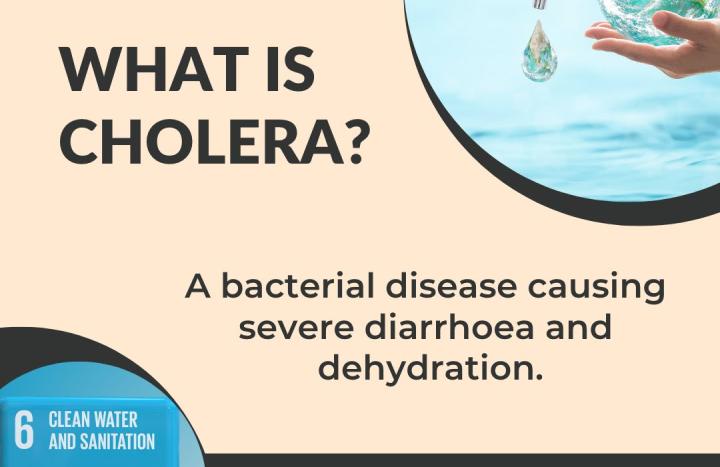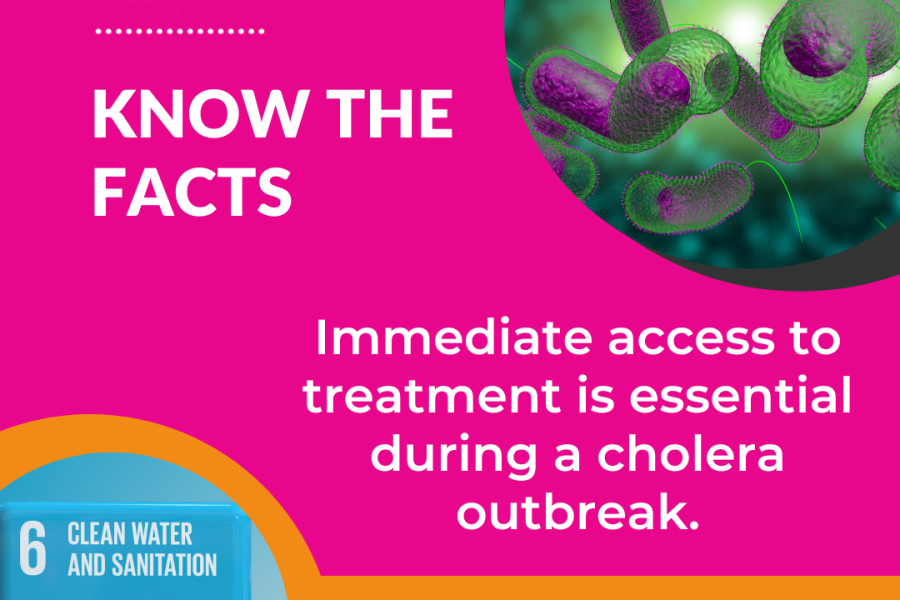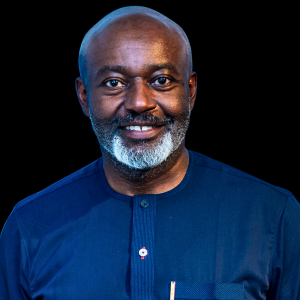31 May 2023 | 10:00 PM - 31 August 2023 | 9:59 PM
Cholera Outbreak Campaign
The UN in South Africa is working closely with National Health & Local Gauteng Health authorities, healthcare professionals, humanitarian relief partners [Redcross South Africa, etc.] & other stakeholders to address the #CholeraOutbreak crisis effectively.

UN entities involved in this initiative
UNEP, UNFPA, UNICEF, WHOSustainable Development Goals
Contact information
tfricker@unicef.orgLocation
About the initiative

The United Nations in South Africa is mobilizing its resources and rallying behind current national efforts to overcome the recent outbreak of cholera including in Hammanskraal area in Pretoria. So far 21 people, including children, have died due to the preventable diarrhoeal disease, with 77 confirmed cases.
“We are saddened by these avoidable and tragic deaths due to cholera and would like to express our deep condolences to the affected families. We wish speedy recovery to those who have been hospitalized,” said Nelson Muffuh, the head of the UN in South Africa and its Resident Coordinator. “We are proactively working together with the national and provincial governments, as well as relevant stakeholders and partners to bring relief to affected communities and prevent a further deterioration of the situation. The UN in South Africa has started mobilizing technical and material resources in response to the outbreak, particularly in the provinces of Gauteng and Free State where the disease has been identified and is intensifying.”
The coordinated efforts of the UN in South Africa, primarily through the UN Children’s Fund (UNICEF) and the World Health Organization (WHO) with the support of the UN Country Team and the UN Communications Group, started in February this year when the first imported case of cholera was identified. The WHO immediately mobilized and deployed seven technical officers in the two provinces to provide support in crucial areas that included coordination, case management, environmental health, epidemiology/surveillance, data management, infection prevention and control. UNICEF in consultation with the UN Communications Group and the Department of Health immediately initiated the crafting and dissemination of awareness raising and other messaging assets.
As part of its commitment to sharing knowledge on the disease with South Africans, WHO recently organized a webinar on cholera in which more than 700 people participated, including provincial and national experts from the Government’s Department of Health. The event helped to share regional cholera epidemiology reports and provide technical guidelines on addressing cholera.
In coordination with the Department of Health, WHO is finalizing plans to assist in epidemiological work, which involves identifying the sources of transmission, and surveillance efforts, including case-based surveillance. Additionally, WHO will support efforts to develop and distribute situation reports throughout the country, particularly in the affected provinces. These measures will contribute to a better understanding of the outbreak, to enable a more effective response.
With its current preliminary efforts focusing mainly on prevention activities, UNICEF, along with WHO, the Department of Health and other partners, has started an awareness raising campaign to educate the local communities on how to prevent contracting cholera through various hygienic measures such as water boiling and frequent hand washing. These outreach activities, which use both traditional and new media, include giving media interviews, both TV and radio, and developing and sharing social media content.
UNICEF has also activated the U-Report platform of 230,000 registered users to send out cholera warning and prevention tips, activating its social listening platform, Talkwalker, and to monitor online chatter and information being shared about the cholera situation. It also plans to use community radio stations and the multimedia ‘Truck’ to educate the public on cholera prevention measures. Other planned activities include activating the ‘Girls and Boys Education Movement’ in schools to expand hygiene promotion messages and procuring water and sanitation supplies for schools as well as early childhood education centres in affected or risky areas.
“With these activities and various others in the pipeline, the UN in South Africa is committed to support the Government and our partners in their efforts to prevent the deadly cholera outbreak from spreading further and claiming more lives,” said Mr. Muffuh.
Background documents
Speakers

